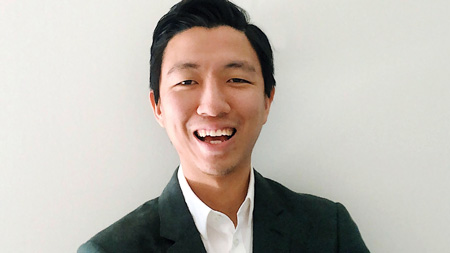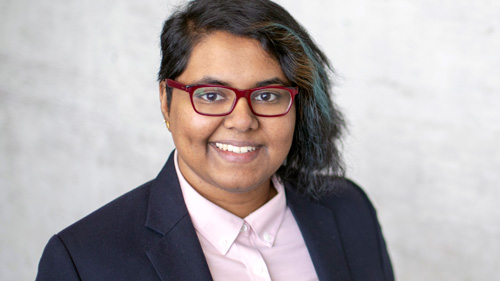Despite huge progress in LGBTQ+ inclusion across society, barriers to career advancement still remain. One 2021 poll conducted by the Canadian Gay and Lesbian Chamber of Commerce found that 20 per cent of business owners in the community face discrimination. A separate poll from Telus found that a third of respondents didn’t view their organizations as safe or inclusive for lesbian and gay employees, which increased to nearly half (45 per cent) when looking exclusively at transgender employees.

Michael Cheung (MBA ’22)
As someone who’s proudly part of the queer community, Michael Cheung (MBA ’22) knows how refreshing it is to feel comfortable being your true self at work.
Luckily for Cheung, the healthcare tech company where he worked for four years following his undergrad had a culture that helped him feel accepted. It was a smaller company with a CEO who happened to be gay, and about 65 per cent of the employees were women, which was also reflected in the senior leadership team.
“I felt very comfortable being an out person at work,” says Cheung. When searching for a school to pursue a graduate degree, he looked for schools with a strong community, knowing it could have a lasting impact on his long-term career growth.
“When I decided to come to Rotman for my MBA, growing as an LGBTQ+ leader in the business community was really important to me,” he says. One of the first clubs he joined was The Letters — Rotman’s on-campus club for LGBTQ+ students and allies (those who support the community, but don’t necessarily identify as LGBTQ+).
Cheung’s foray into student leadership was on the Day of Pink, where a group of first-year MBA students in The Letters organize a day celebrating anti-bullying, anti-homophobia and anti-transphobia on campus. It’s an annual event packed with performances, Q&A panels and socializing, where students and faculty can wear the iconic Day of Pink T-shirts to show support.
On this year’s Day of Pink in April, he recalls walking into the School and seeing one of Rotman’s vice deans wearing the pink T-shirt.
“The Letters is always open to allies, but on that day especially, seeing other folks in the Rotman community showing their support was really meaningful,” he says.
Cheung just wrapped up his year serving as co-president of The Letters, which is now gearing up for its ninth year at Rotman. He says the best part of the club is connecting with the Letters community, which includes current students across programs, alumni and industry professionals.
“My time at Rotman has reignited the fire in me to be a voice for the queer community,” he says. After graduation, Cheng’s next adventure is a career in consulting with Strategy&, the global consulting arm of PwC.
Since Toronto attracts students from all over the world, Cheng says it’s understandable that some people may not be as familiar with the LGBTQ+ community.
“People might have questions, and that genuine curiosity is always welcome,” he says. “Even if you identify with the community but aren’t yet out, The Letters is an incredible way to build a community for yourself. Joining is not saying ‘I’m gay’ or ‘I’m queer,’ it just means you’re in support of our community.”
“Sometimes, seeing firsthand how comfortable people are in their sexuality is what can really lead people to become comfortable with themselves.”
For Arundhati Sriraman (MBA ’19), who served as The Letters president in 2018, her journey to being outwardly queer wasn’t always easy. She expresses herself through her hair and outfits — her hair was dyed blue for a while, and she prefers to wear more masculine clothing. When she lived in India for a time before Rotman, pride marches were a protest with police escorts, not the celebratory party it is in Toronto.

Arundhati Sriraman (MBA ’19)
“I’ve lived in many countries, growing up in the Middle East, going to college in California then moving to New York, living in India, and now I’m here in Toronto,” she says. “When I was at Rotman, it was one of the few places where I felt like being queer wasn’t a big deal, and that’s a privilege not many places will offer.”
During her initial interview with Rotman, she recalls feeling like her hair and clothes were both a fun conversation and not a deciding factor for the admissions team.
“It was so nice, and I didn’t get that feeling from any of the other business schools I had applied to,” she says. “I knew I would fit in here better than anywhere else.” And indeed, she did. Sriraman, who was named one of the best and brightest MBA students in 2019 by Poets & Quants, thrived as an active member of The Letters during the program. Her year as president was marked by a string of fun outreach events, including a midday drag queen performance near the Exchange Café and karaoke nights in collaboration with the Rotman Music Club.
“We wanted everyone to know that we were here and queer — we wanted visibility,” she says.
But Sriraman says there’s still work to be done for inclusion in the LGBTQ+ community, even in a welcoming city. According to a 2019 McKinsey report on inclusion in the workplace, LGBTQ+ women — especially women of colour — are dramatically more likely to experience “onlyness” (being the only one in the room of their gender, race or ethnicity or sexual orientation).
Sriraman recalls preparing for a job interview and asking a trusted mentor what she should do — “Should I show up in a suit and tie because that’s what I wear normally?” she asked. Her mentor advised not to do it, that it “wasn’t worth the risk.”
“I still don’t think they were wrong in saying that,” she says. “They’re part of the LGBTQ+ community themselves, and they just wanted me to have the best chance at succeeding in an industry that can still be traditional in many ways.”
True to her character, Sriraman showed up to the interview in a suit and tie anyways. While she ended up landing a different job, she says the experience made her reflect on how and when the business community can be a more inclusive place for LGBTQ+ professionals. “The existence of the Institute for Gender and the Economy (GATE) gives me hope. The existence of The Letters gives me hope,” she says.
“I hope we can make it easier for the next group of people who might feel like they need to cover who they are in job interviews because they’re scared.”
Written by Jessie Park | More Student Stories »